Rick Wayne's Blog, page 102
March 16, 2015
People With Big Heads Are Stupid
people who are successful resent the implication that they are so by chance. this is really the wrong way to look at it.
out in the world, in any field or art form, there is a great mix of talent and effort. some people are lopsided, others evenly balanced. some people are just posers with too little of either.
successful people believe they are being compared to that great mix, when usually they are not. they are being compared to a subset of it, to those of comparable skill and hard work who are not successful. and there are many of them.
the truth is, there is an invisible sorting that takes place, a separation of those above some minimum threshold from those below. most successful people are chosen from this group. (note, i am not saying we have a meritocracy. i'm not saying the "best" or "most deserved" -- however we might define those -- rise to the top, just that successful people in any field or art form tend overwhelmingly to be above some floor.)
successful people, i argue, are basically drawn at random from this invisible grouping. there are high-talent success stories and mediocre-talent success stories. there are stories of long struggle and stories of overnight success. there's no reason to any of it. the race is not always to the swift.
but because we don't see this sorting, because the only sorting we do see is successful versus unsuccessful, and because SO MANY unsuccessful people are in fact shit, it's easy to think that anyone who is not successful must be ill-deserving: having too little talent or giving insufficient effort.
furthermore, successful people have privileged knowledge about all of the trials and setbacks they faced, which gives the appearance of validation -- "i am successful because i overcame obstacles" -- whereas they have little to no visibility into the obstacles faced by others, which will in some cases actually be greater.
yes, sometimes no-talent hacks are successful. this is true. but frankly, it is also rare. YOU might think a person has no talent, but if they are successful, that usually means other people disagree. (be wary of sour grapes.)
similarly, the true virtuoso is also very rare -- the mozarts and the michael jordans. most successful people are not in this category, although they may think they are.
so success is meted out at random to members of an invisible group, with none of us ever knowing if we are members of that group.
if you think about it, this is proven and re-proven by every artist who died penniless only to be "discovered" later. i think of edgar allen poe lying dead in a gutter. here was a man who invented the detective story and who elevated horror to an art form, dead in the street. fortune did not favor him in his lifetime, and if you passed his corpse, it would have been easy to dismiss him as undeserving.
after all, the myth goes, the world rewards talent and hard work, and if he were deserving, he would have made something of himself. but he didn't, so he's not.
it's a humbling thought and something i wish the kanye wests of the world could understand.

March 12, 2015
The Art of the Collage: Visions of Excess
If you don't follow the art world -- which is its own thing separate from the art itself -- you may not know that the collage has made something of a comeback. First appearing in the early 20th century, the term derived from the French "coller" and was coined by both Georges Braque and Pablo Picasso.
As a distinct form, collage developed alongside other modernist movements (like Dada) and persisted into the pop art movement of the 1950s and 60s. In fact, the first iconic work of pop art is Richard Hamilton's Just what is it that makes today's homes so different, so appealing? which appeared in 1956.
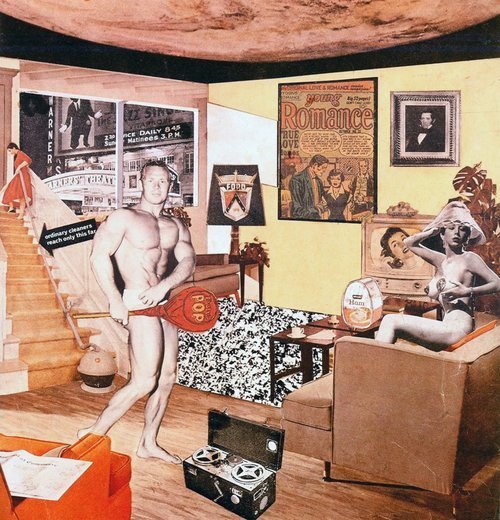
But after mid-century, collage largely devolved to handicraft, worthy only of elementary school scrapbooks (or so one would have been told), probably because of the medium's popularity and the ease with which it could be replicated. There were exceptions of course -- there always are in art -- but for most of the last four decades, collages were not regularly being shown and sold in galleries, nor collage artists being featured in contemporary art magazines.
Recently all that has changed. One can give any number of reasons, but I blame hipsters, particularly their fascination with upcycling and irony.
But like most things these days, it starts with this thing you're on. The Internet.

Cobra Command by Morgan Slade
We shouldn't underestimate the power of the internet to play on the collective psyche. Not only do we have well over a century of mass produced media -- particularly periodicals, which is where much of the fodder for collage comes from -- but in the last 25 years, most of it has been brought online. Even where something has yet to be digitized, it is likely to have been collected, indexed, and sold on sites such as eBay.
All that means we are aware of ourselves as no previous culture has been, and through our collected access to all the magazines, books, movies, albums, advertisements, news reports, pornography, political speeches, plays, TV shows, toys, games, home appliances, automobiles, and hair care products, we are aware of ourselves first and foremost as a culture of excess.
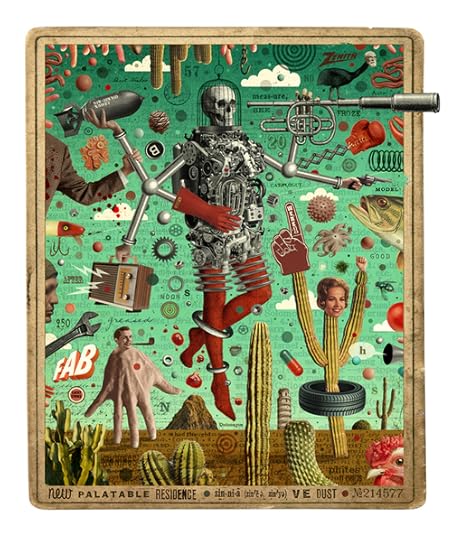
Michael Waraksa
No format celebrates excess better than collage.
But it is precisely because we are so aware of ourselves that, as observers, we cannot participate in art directly (as previous cultures did). When we look at a painting, we are aware that we are looking at a painting, we are aware of art theories which describe both the painting and our looking at the painting, and we are aware of the history of both painting and of art theory.
This is true ESPECIALLY if you know nothing about art. That's because the relevant bits are likely to have been neatly summarized for you on a plaque on the wall, or in the handy fold-out museum guide, or in the automated audio tour that came with an upcharge. Such summaries tell you, even where you don't understand them, that viewing art is a complex activity with a long history and probably a bunch of science behind it. And stuff.
Like the high school student who employs sarcasm to mock whatever she lacks the confidence to participate in, we don't allow ourselves to appear unsophisticated, to drop below the "meta-level" of theory and criticism, to be the object of description -- museum-goer, art viewer, naive actor -- rather than the author of it. Thus we can only experience art ironically.
[image error]
"In the Pavilion of the Red Clown" by Robert Williams
[image error]
"When Fairy Tales Collide" by Todd Schorr
You can see the precursor to the freneticism of collage in the works of artists like Robert Williams and Todd Schorr, whose paintings appropriate cultural icons to ironic effect. (Mickey Mouse seems to be a favorite target.)
Collage takes this one step further by dropping the interpretive act -- paint and brush -- and using the detritus of the culture of excess (collected and indexed thanks to the internet) as the medium itself. Arranging magazine clippings is a way of serving our refuse (upcycled!) back to us as if to say, "see what we've become?"

Eduard Bezembinder
For example, take the work of Eduard Bezembinder, who combines the "low brow" cultural detritus of mass produced, pop culture printing with (the equally mass produced) reproductions of old "high brow" art, which is an effective if less-than-subtle reminder of what we lost.
That's not to say there aren't highly original works of art being produced today. There are. More than ever. (And if you follow my streams on social media, you've seen quite a bit of it.) Nor am I suggesting a collage itself isn't original. Of course it is. As much as anything else.
What we've lost is not the ability to make great art but rather to experience it naively.

Travis Bedel

Nikolas Gambaroff

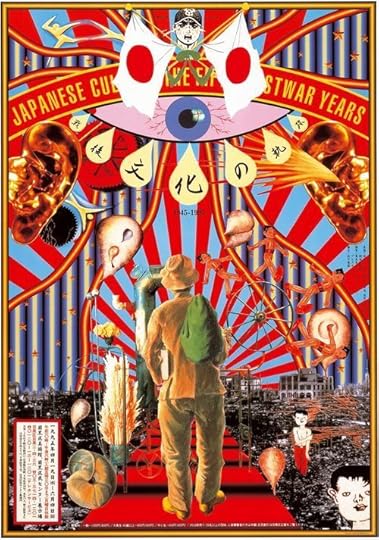

Alfred Steiner



Eduard Bezembinder
February 8, 2015
You're Doing It Wrong
There's an art both to giving and to receiving constructive criticism.
Garden variety criticism is best left at home, but at some point, any creative person is going to need constructive feedback. (This idea of the artist as a lone genius is a myth. Everybody has a scene, especially at the beginning.)
Giving good feedback -- and giving it well, which is different -- is harder than receiving it, although in my experience, most people think it's the other way around. But then they also think the hard part about receiving feedback is dealing with the sting. Not true.
Yesterday I sent out the beta draft of Episode Three of my serial novel. Some wonderful volunteers are going to read it in the next couple weeks and give me their top-of-mind reactions. Some of it will sting. I'm honestly looking forward to that.
The sting of critical feedback is the muscle burn of intense exercise. Would-be professionals crave it because they understand it's the only way to perform at that level: feedback + practice, over and over until you die.
Not everyone wants to be a professional, of course. and in that case there's nothing wrong with keeping your work to yourself. But if you want others to enjoy your creativity -- particularly if you want them to give you money for it -- then you need the sting.
I've seen lots of folks get hung up there, but that's not even the hard part. The hard part is making a common sense of disparate points of view and not letting your ego discount it all with dismissive statements like, "my fans will understand."
Your fans don't owe you shit, certainly not their patience. They may choose to give it to you, but the longer you lean on their good graces, the fewer fans you'll have. They don't owe you. they are your customers. You owe them.
This is why, for writers anyway, beta feedback is so important. Lots of big name authors (who can get away with cutting corners) publish what I would call a beta draft. The manuscript is in reasonable shape, the characters are well-constructed, but something's missing: the plot is poorly engineered or the dialogue runs flat.
For me, the beta draft is the frustrating draft because it's nearly impossible to see what needs work. You'd think then that getting various points of view would make that easy, but no. Every reader comes with a different set of eyes, a different set of expectations, of life experiences, of second-guesses as to what you're wanting from them.
For example, Reader A may talk about the pace being slow in certain spots, but that she liked Character X. Reader B might say he couldn't really get behind Character X, but that otherwise the story kept moving.
With some detective work, you may find that the slow spots identified by Reader A mostly involve Character X, which, coupled with the feedback from Reader B, would indicate that character, rather than the pace, is the real problem.
(Here I follow Neil Gaiman: when people tell you something doesn't work, they are usually right. When they tell you how to fix it, they are usually wrong.)
And then there's the meta-level: analyzing the feedback received across multiple stories. Are there themes? Are your beta drafts consistently bulky? Do you have the tendency to fall back on the same tropes and limitations?
(practice + feedback)1 + (practice + feedback)2 + ... (practice + feedback)N = self-awareness
All of THAT, rather than the sting, is the real art of receiving criticism.
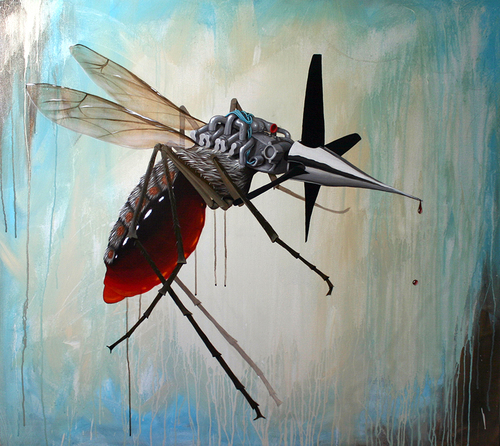
art by Robert Bowen
January 27, 2015
Where Have All the Villainesses Gone?
“Isn’t it time to acknowledge the ugly side? I’ve grown quite weary of the spunky heroines, brave rape victims, soul-searching fashionistas that stock so many books. I particularly mourn the lack of female villains — good, potent female villains. Not ill-tempered women who scheme about landing good men and better shoes (as if we had nothing more interesting to war over), not chilly WASP mothers (emotionally distant isn’t necessarily evil), not soapy vixens (merely bitchy doesn’t qualify either). I’m talking violent, wicked women. Scary women. Don’t tell me you don’t know some. The point is, women have spent so many years girl-powering ourselves — to the point of almost parodic encouragement — we’ve left no room to acknowledge our dark side. Dark sides are important. They should be nurtured like nasty black orchids.”
-Gillian Flynn, author of Gone Girl
I have to be honest. As much as I wanted to enjoy it, I found the plot of Gone Girl to be surprisingly ludicrous -- a parade of twists and hand-waving -- but the premise and the characters (Amy more than Nick) were rich and compelling, and I give Ms. Flynn mad props for taking on a challenge.
I really dig this quote. She is spot-on. While we certainly need more female leads, the spunky, Kewpie doll-heroine is only going to take us so far.
I love action stories -- I stopped reading literature and watching "films" years ago -- and I love women in action stories as something other than a damsel. It's fun when the 110-lb. girl roundhouses the 220-lb. bad guy into the wall. It's not at all believable, but it's waaaaay better than her screaming in the corner with her polished nails to her lips, waiting for her hero to save her.
But on some level, we're all still subtly aware that she's in a Title IX role (Gillian's "parodic girl-powering"). She's a woman doing man-things, just with a low-cut top and model-perfect hair. To understand why that matters, we have to understand a very important fact about fiction: heroes must follow the rules. Only villains are free to make their own.
To be clear, "the rules" don't have to be the law or anything like it. They could simply be the hero's own moral code, his sense of what's right. Nor does the villain need to be missing such things. (In fact, some of the best villains are overzealous legalists.) But when pressed to the limit, the hero does what's right. He may waver, but in the end, he lives how we wish we had the courage to. This may be as simple as sticking with his life's dream of owning a farm after some financial trouble and a year of bad weather.
The villain, on the other hand, is anyone who gives up or sacrifices what's right to achieve an aim, even where that aim might once have been good.
We'll know sexism is gasping when people don't think twice about female villains, and I'm not talking about the manipulative bitch or jilted vixen, which are mere perversions of the two traditional feminine roles in fiction: mother or sex object. I mean straight up inventive, devious, deep, cunning, ruthless, potent villains.
Not Harley Quinn, but the Joker. Not Clarice Starling, but Hannibal Lecter. Not Princess Leia, but Darth Vader. Can you image Alex DeLarge, the protagonist from Anthony Burgess's A Clockwork Orange, as a woman? How much would that change our feelings about the rape scene? Or her anti-violence "treatment"?
That doesn't mean we can't enjoy a good sultry villainess, like Catwoman. Personally, I have a very sick fascination with The Baroness from the G.I. Joe franchise. (Google her.) On their own, I don't think there's anything wrong with those characters, just as there's nothing wrong with Thor as a variant of the stock, hypermasculine hero.
But part of the problem is that we see gender as a spectrum with fixed poles. In such a system, women are only free to occupy new roles in fiction when men get out of the way, when we change our attitudes about masculinity. What if 50 Shades of Gray were about an older, wealthy woman who sexually manipulates and sadomasochistically abuses a younger, naive man? It's been done, and it always seems more sinister somehow -- horror/thriller rather than erotica.
I argue that's not because women can't be dominatrixes, clearly, but because men are not free to be weak and submissive, which comes across less sympathetic than simply pathetic. A male protagonist can be flawed: pathologically shy, for example. Damaged characters are interesting in any role. But if he's passive, an object, we have no sympathy.
Of course, there are a few great female villains out there. It's been easy for later writers to re-imagine the Wicked Witch and Maleficent as heroes because the original villains were so robust. But those are fairy tales. And Nurse Ratched and Annie Wilkes (Kathy Bates's character in Misery) are both nurses. However well-imagined, they are all still perversions of traditional feminine roles: the witches are the dark antithesis of the hero's princess/sex object, and the nurses the opposite of the caretaker/mother.
I'm with Gillian. Gimme more.

January 21, 2015
In Which I Break My Own Advice and Respond to a Critic (or three)
As a general rule, it's a bad idea for authors to respond to their critics. There have been enough real world examples in the past year alone that prove it's rarely, if ever, a good idea.
[Insert big fat HOWEVER] A few times now -- well, three to be exact -- someone has told me that Episode One of THE MINUS FACTION was great and generally a believable superhero kinda story... except for one thing: muscle memory.
(Note: what follows has a spoilers for those who haven't read the book, but there are no spoilers for the rest of the series, so if you've read E1, you're in the clear.)

The criticism goes something like: there would be no way for John to perform the kinds of complex martial arts moves that he does because, in projecting his consciousness into another body, he leaves behind his "muscle memory," which is where the ability to do those things is stored.
The first two times someone said this to me, I just shrugged. (Okay... there might have been a small rant in private.) Every reader or viewer has different tolerance for suspension of disbelief, and it's rarely consistent. Like all matters of taste, there's no point in arguing it.
Also, I want to be clear that no one has to like the book. No one has to think I pulled off the story well. As an author, it's my job to be convincing. You shouldn't have to push yourself to buy into it. If I'm doing my job, it should be automatic.
But since I just heard this criticism a third time (that's three out of -- I'm happy to say -- a few thousand readers), I want to address it, whether that's a smart thing to do or not.
Here's the deal: there's no such thing as "muscle memory." Muscle tissue doesn't have information storage. What's more, the axons that ennervate muscle tissue only carry information one way. That's actually the primary classification for nerves, whether the fibers are afferent or efferent.
Nerves that carry pain information are afferent. They run from the body to the spinal cord (the threshold of the central nervous system) and are different than the nerves that tell the muscles in the arm to contract in response to that pain. Those are efferent fibers whose axons conduct a pulse from the spinal cord to the body.
What we call "muscle memory" is a type of procedural memory stored (with all your other memories) in the brain and that "guides the processes we perform and most frequently resides below the level of conscious awareness. When needed, procedural memories are automatically retrieved and utilized for the execution of the integrated procedures involved in both cognitive and motor skills, from tying shoes to flying an airplane to reading. Procedural memories are accessed and used without the need for conscious control or attention. Procedural memory is created through "procedural learning" or, repeating a complex activity over and over again until all of the relevant neural systems work together to automatically produce the activity" (Wikipedia).
If you believe that a man can control another human being remotely, and in so doing take all of his memories, his experience, his ability to read, to speak English, to swim, to tie his shoes, or even to walk upright -- all of which are things we had to learn how to do at some point -- then martial arts moves really wouldn't be any different.
"Muscle memory" is not a GOTCHA! It's not a criticism of the premise. At all. It's like saying you don't believe the conspiracy theories about the Kennedy assassination because everybody knows Bigfoot did it. And being serious.
I hope no one ever feels the need to look very deeply at the story -- that suggests you weren't just reading along and enjoying yourself -- but if you did, you'll notice that beyond this, I even went so far as to make sure that the things John does in someone else's body are completely able to be performed by that body.
For example, in the opening chapter, he's in a coma patient. Probably there would be some muscle atrophy, even after 2-3 months. Thus, John's moves are limited to a couple slaps of the hand and some pushing. Other than that, it's marksmanship, which takes no special strength but is a motor skill (that also requires "muscle memory") like walking, speaking, or tying his shoes, which no one seemed to have any problem believing would convey.
Also, during the fight scene at the end, he's inside a special agent -- a soldier basically, someone whose job it is to fight and use weapons. Presumably that person would be in "active duty" shape at least well enough to reasonably enact the kind of moves John performs.
Finally, I don't really get into this in E1 (but it will come up more later as it ties to the overall plot of the series), John doesn't actually "leave" his body. It feels to him like he does, but in this fictional world, I have it where he's actually able to quantum entangle the particles that mediate his consciousness (the way air molecules mediate sound information) with a nearby brain, thereby allowing for instantaneous action at a distance. But his physical brain is still the seat of his consciousness. It's just controlling another central nervous system remotely like a drone pilot controls a drone.
But ALL OF THIS is fantasy. It's science fiction. It's just supposed to be fun. Period.
I don't want to offend anyone. Again, no one is obliged to enjoy the book for any reason, and if it just didn't work for you, there's no further explanation required.
But the "muscle memory" bit is hogwash. I'm sorry. The great thing is, you don't have to take my word for it. There's actually some science involved here, so you can Google it and see for yourself.
Thanks and have a nice day.
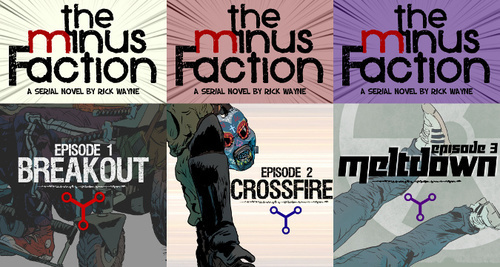
January 7, 2015
Fashionable Bullshit
There's a lot to discover in postmodern thought. Really. It gets a bad rap in certain circles, but good post-modern thought reveals the timbers of an invisible house in which we all live. It makes patent the occult structures of society that constrain our options often without our knowledge.
Which is why it bothers me when I run across passages like this:
“Ten years ago it seemed possible to destroy language through language: to destroy language which normalizes and controls by cutting that language. Nonsense would attack the empire-making (empirical) empire of language, the prisons of meaning. But this nonsense, since it depended on sense, simply pointed back to the normalizing institutions … Thus, an attack on the institutions of prison via language would demand the use of language or languages which aren’t acceptable, which are forbidden.” - Tactical Readings: Feminist Postmodernism in the Novels of Kathy Acker and Angela Carter (2002)
My first response was, "no shit." Any satirist or stand-up comedian worth his salt could have told you that, let alone any philosopher after Frege. How naive (and ignorant) do you have to be to think that would ever work?
[Side note: I started college in 1992, the exact time referenced in the opening line of the passage. There was a lot of fashionable nonsense floating around then, and not just in the humanities. Chaos theory -- the suspicion that there was a secret order hidden in disorder -- was all the rage in mathematics.]
Then there's the sing-songy, juvenile wordplay that hints at -- but doesn't quite explicitly claim -- a relationship between similar sounding words: empire and empirical.
The word empire comes from the Latin imperium, or absolute authority, which itself is derived from the verbimperare or "to command."
Empirical on the other hand is the descriptive form of the noun empiric, which means someone who works from experience (rather than abstraction or theory). It comes from the Greek empeirikos, which has the same meaning and derives from empeiria -- "experience."
Two different words. Two completely different origins. That they sound similar in English is happenstance, not evidence of some secret concordance.
But the worst part of the passage -- by far -- is the assertion that certain languages and modes of thought are out of bounds, are FORBIDDEN. I'm sorry, but there is no higher expression of anti-intellectualism.
None.
I consider myself post-modernist and feminist, although those words refer to such diverse sets of views, I'm not sure either means much on its own anymore. Qualifiers are required, as is caution.
Any -ism is a pair of prism-lensed glasses. You carry a whole set but you only pull them out when the world appears distorted. Those who wear them all the time are, frankly, insufferable.
I believe the highest human aim is understanding -- of ourselves, of the world, of each other -- and for that we need to communicate. And to communicate, we need symbols with an established common meaning. How else to share and learn?
I don't see words as "prisons of meaning." In fact, the study of language is the study of change. Poets -- the masters of words -- don't sit in coffee shops complaining about the dictionary. They understand that a concateny of words isn't a beaded prison. It is, like life, a kaleidoscope of possibility.
If you don't like how it looks, spin it again.

December 21, 2014
The Seven Deaths of . . .
They call me Harry. Despite what you may have heard, I’m nothing special. Trust me. But after you make it through a couple bad jobs, word gets around. You get on some short lists. They call you again. For transports, mostly. Escorts. To be honest, I haven’t been too picky about the clientele, although I do have a little guilt about that. But I gotta pay the rent, same as you. Heaven’s fun to work with and all, but Hell pays better. I figure when I win the lottery, I’ll donate my services to the Big Guy full time.
But that’s not what you wanna hear about. So here goes.
The first time I died was because of an angel on her way back to Heaven. It was kind of a big deal. Angels are majestic fucking creatures after all, and holy books all over the world are full of people falling to their feet and renouncing their sins at the sight of one. Physical manifestations of God’s grace and all that. Good things happen in their wake, I can tell you. Miracles. And you feel like a million bucks for days after.
That’s why the priests keep them shrouded – big, thick sunglasses; hoods; long coats; that sort of thing – and why they pretty much never speak. Supposedly that’s cheating. Supposedly people have to choose on faith or whatever, unswayed by angelic or demonic presence. It’s a bunch of horseshit, frankly, because both sides break that rule all the goddamned time. (Just don’t quote me on that.)
So here’s a cosmology lesson for you. The planes of existence aren’t all connected to each other. It’s fucking complicated, but basically it works like this. You can go from A to B and from A to C, but you can’t go from B to A, so if you’re on B, and you want to get to A, you gotta go through C.
Don’t ask me. I didn’t make the rules.
Earth is pretty much in the middle of everything, like the crossroads of existence. The Norse weren’t wrong about that. That’s why it’s so fucked up. We get the shit from everywhere. It’s also why there are so many transport jobs, and why it’s so risky. For all the lawyers and politicians we have – more per capita than just about anywhere, I’m told – Earth is still a mostly lawless, immoral ball of dirt, so if you’re looking to pinch someone from the other side, it’s better to try it here than just about anywhere else in existence.
Go us.
Only you can’t get to Heaven directly from Earth. You can go through Purgatory, but since that’s basically Hell-Lite, it’s not anyone’s preferred path. Next best thing takes you through three higher planes, which is fine since any number of nexuses on Earth can send you up one. You just need a ley line that runs in your direction, kinda like making sure you’re on the right track at the train station.
Used to be we listened to the geomancers and were careful where we built our shit. The Chinese still have the good sense to follow the rules of feng shui (for the most part), but the rest of the planet is all fucked up. Turns out there’s an upward-facing nexus at the top of the Hyatt Regency just outside O’Hare Airport, Chicago.
Who knew?
I was supposed to wait in the lobby until the angel showed up with her retinue. I was to nonchalantly follow in a separate elevator along with the rest of the crew, who were all milling about like we were waiting for a cab or something. And that’s pretty much exactly how it started. She came in like a pop star with monks for groupies. When they got into the elevator, I put down the magazine I wasn’t reading and followed.
Only I got stuck behind some members of a wedding party. This was a Sunday – angels try to do their traveling on the Sabbath – and the family were all leaving town after the wedding the day before. As the elevator stopped at each of their floors, they had to take like five fucking minutes to say their fucking goodbyes. By the time I got to the top, shit had already gone down.
Bodies slumped in the hall. Blood. A muffled scream from one of the rooms. The door was open, and I froze.
The monks and priests who organize this shit like to keep it all nonlethal. Fuckers. And they won’t fight themselves, which is what they hire us for. It was a condition of our employment that we could carry nothing more than a baton or a whiffer. I chose the latter, which, if you don’t know, is basically a battery-powered electrostatic air purifier with a blessed cross on the front, or maybe a reliquary of some kind. Fits in your hand. Blows holy air.
I’m not even joking.
If you get them in the eyes, it’s kind of like mace to a demon. Stuns them, blurs their vision, maybe puts them down, but also wears off quick. Holy water is better, but that does permanent damage and has even been known to kill, so it wasn’t allowed.
I thought about leaving. I really did. The pay wasn’t that good. But there were those tiny screams, like an animal – a bird or a puppy – helpless and crying. I cursed and pulled the whiffer and crept toward the room. I was alone in a hall full of the dead. I peered with one eye around the open door.
The demons were all in suits. They had dropped their disguises and their burned, ripped, skinless, deformed faces created quite a contrast with the Armani. They had the angel on her knees. One of the demons, a succubus with a pinned-open skull, held the angel’s arms behind her back. A male scourge demon had the angel’s head in his hands. He was forcing her mouth open while a second male stood over her and pursed his scaly lips. Two more stood by the door. They watched the action with their backs to me.
I fought back a gasp. A caustic ooze, full of fire and sin, bubbled up from the demon’s throat and fell in frothing drops into the angel’s open mouth.
Now, this is heresy, I know, but God has some fucked up sense of humor. He set it all up so the path of Good is full of patience and tenacity and wisdom and being the bigger person but not getting a big head about it and all that kinda crap. Being a saint is like swimming upstream. Every. Fucking. Day. It’s exhausting.
Meanwhile, falling into Hell is like falling down a hole. You don’t have to do much of anything except be lazy and not pay attention. God waits for us to choose, but the Devil claws at us, all the time, and it takes effort just to stand upright in the same damn place, let alone to climb upwards to Heaven.
All that means is that the artifacts of Heaven – like my stupid whiffer – repel demons, force them away, while artifacts of Hell – like the foam – have the opposite effect on angels. Demon venom is like heroin to the other side, only once it gets inside, the angel is corrupted.
That’s what demons do. Take a little good out of the world every fucking day.
To her credit, the angel struggled, but there were too many of them. Bastards. Unless an angel is one of the heavenly warriors – and there’s not many of them left these days – their power is not strength but grace and compassion, and while that’s great and all, it doesn’t do shit for you in a fight.
But those gurgles . . . And the fear in her eyes. And the knowledge that she’d never be allowed back into Heaven. It was too much.
I burst in with the whiffer and hit the two demons standing by the door. They turned and I got ‘em right in the eyes. They screamed and clawed at their faces. The others stopped. The angel dropped to the floor. Her eyes glazed. She was tripping hard on devil goo.
So, demons can play dead. It’s one of their many tricks. In the rush, I didn’t have a chance to check the hall. I took a risk and paid for it. One of the bodies on the floor wasn’t a victim. He was a guard. Playing possum. That’s why the others just waited. They saw him sneaking up behind me.
I felt a stab in my back. I went down. They laughed. I’m sure they all thought I was good as dead. And I should have been.
I mentioned before that I’d survived a couple bad jobs. There’s a reason for that. Turns out I’m immune to demon venom. It’s rare, but it happens, kind of like how some folks way back when were immune to the plague (which Hell totally started, by the way). Different demons have different kinds: shit that burns, shit that rots your flesh away, shit that drives you mad. So far, none of it’s done so much as give me a headache and a killer craving for Cheetos.
But still, being stabbed fucking hurts. So there I was cringing on one knee from the venom-filled talon some asshole hellspawn just jabbed into my back and with nothing to defend myself but a fistful of God’s holy farts.
The demons lifted the angel off the floor. She stumbled to her feet as they dragged her to the back toward a chair by the window. I could see downtown Chicago in the distance. Meanwhile, I was losing blood, and at any moment the demons would realize the venom hadn’t done the trick and would dispatch me the old fashioned way.
I didn’t really see where I had much of a choice, ya know? So I charged forward, tackled the angel, and crashed through the window. Sometimes it’s good to be husky.
Did I mention we were on the twelfth floor? That’s a loooooooong way down.
I’d like to say there was a pool at the bottom or a terrace just below. I’d like to say the hotel’s linen service was making a delivery at that exact time and that I landed on a pile of sheets.
But nope. Pavement city.
Didn’t hurt too bad seeing as how I died on impact.
And no, I wasn’t worried about the angel. Angels’ feet never touch the ground. The angel would float to a stop. The angel would be fucking fine.
All other things being equal, I should’ve gone straight down to the bad place. I haven’t been particularly evil, but I can’t say I’ve done much to swim upstream either. But seeing as how I died sacrificing myself for one of the Holy Host, I caught a break and ended up in between. Where the deals are made.
Technically, Limbo isn’t really anything, but what my mind saw was an endless hall of meeting rooms. I sat in one, behind a fold-out table – bureaucrats are cheap bastards everywhere – for what seemed like an eternity. And it probably was. I wasn’t sure what to expect. From what I heard, sometimes you got a deal from one side, sometimes from the other, sometimes both declined and you waited there in one of those rooms.
Forever.
I’m not sure what I expected, but it for damn sure wasn’t the bonus plan. Reps from both sides showed up and sat next to each other, expressionless. They slid their deals to me across the table. I said I needed a minute to look things over. You know, because it was such an important decision.
Sitting there alone in that room, eyes moving from packet to packet, I had a crazy thought. I lifted the pen-shaped needle they provided and pricked the index finger on both my right and left hands, then pressed them onto each deal simultaneously.
Guess what? No one had ever done that before, and apparently I shorted out some major shit. The deals canceled each other. Black was white. White was black. Whatever. I don’t know. But while they were running around trying to fix it all, I got sent back. I think they just wanted to be rid of me.
So there I was back on the pavement in front of the hotel, lying in a pool of my own blood. People are screaming. Next to me the angel is still tripping balls on demon spooge. I got a good look at her then. Wow.
Just wow.
I might have had a religious experience if a gang of Hell’s hooligans wasn’t about to come down and rip my face off.
So I stood up, wiped off the blood, smiled at the gasping bell hop, grabbed the angel’s arm, and bailed.
You’d think that would have been the hard part. You’d think that after beating demons and saving an angel and jumping from the twelfth floor and dying and shorting out the whole sorting system and coming back, things would have gotten a little easier. You’d think.
But you’d be wrong.
The universe has rules, as you probably know – things like the fucking gravitational constant and the conversion of matter to energy and don’t cry over spilled milk and dropped toast always lands on the buttered side. Supposedly everything is set up so that anyone can die seven times without a hitch. I guess they thought that would be enough of a buffer. I mean, you’re only supposed to die once, right? But then Jesus brought Lazarus back. And himself. And the bones of the prophet Elisha are supposed to resurrect anyone who touches them.
But for all of human history, that’s how it’s been. Onesies and twosies. No one’s gotten close to seven. In fact, as far as I know, the most anyone ever died was three times, and that was a fucking exceptional case. But since no one ever hit seven, no one knows what happens when you get there. Some people say the whole cycle of life and death breaks. Some say you meet God. Some say you just stay dead, except that this time nothing can bring you back (except maybe the Word of the Head Honcho himself).
Seven times. That’s what the universe was built for. That’s important.
They call me Harry, but my real name is Harriet. Harriet Chase. And this is the story of how I died seven times.
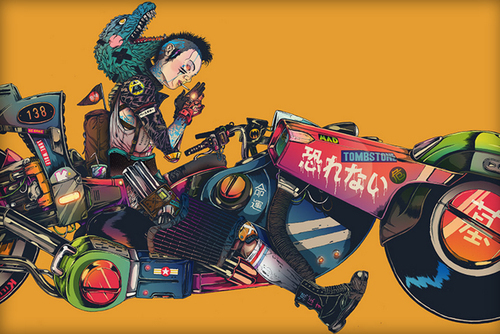
null
November 24, 2014
On Perversion
pervert can be a verb or a noun. when we pervert something, we alter it from its intended course -- we distort or corrupt -- while a pervert is the thing distorted or corrupted.
as a noun, pervert has both a strong and weak form. the weak is often self-applied. for example, i often refer to myself as a pervert, which is true. the strong form is usually screamed and followed by a hasty exit.
some people think homosexuality is a perversion. some people think masturbating to hentai is as well, or coprophilia.
the disgust is (for the most part) understandable, although probably best kept to yourself. that is, not everyone has to like what you like. they are free to find it distasteful. they are not free to discriminate.
but bigotry does not come from disgust. it comes from fear. people fear the perverted, but rarely because of the perversion. rather, it comes from our implicit binary division of the world.
we each live at the center of a circle. inside that circle is everything we find rational and reasonable. outside that circle is everything else.
when someone admits to being aroused by human excrement, or animals, first there is disgust, then aversion, because if that person can indulge such a thing, if they are actually capable of that, then they are outside the circle and who knows what else they might do?
it's a cliche that we fear the unknown because it's a truism. and anything outside the circle is not just unknown, it's irrational, unpredictable. hence bigots often see perverts as subhuman, something closer to a lion, where you're afraid because you're never quite sure what the beast will do.
disgust also implies contamination and therefore contagion: corruption spread by contact. and then we're back to fear.
i am a pervert. that i am aroused by the genuinely obscene does not make me any less rational. i am no more likely to steal or commit murder or run around covered in peanut butter than you.
in fact, in my experience -- and jung's -- those who are aware of their demons, who acknowledge them, are in control. it is all you fools who pretend to have none that worry me.
normal people are outside my circle.

November 12, 2014
Audio Drug Samples
Like drugs, man. The first hit is always free.
November 6, 2014
On the Rationality of Disenfranchised Non-Voting

In college, I took a poli sci class on the American Presidency. One of the things we learned was that the president's party tends to lose seats at midterm elections and that this effect is often more pronounced with a second-term president. (Note: this is a tendency rather than a rule.)
That was TWENTY YEARS AGO I learned this. I don't understand why everyone is confused by the 2014 midterms. This is not a new thing.
You all can believe whatever you want, but let me give you something to think about.
In statistics, there is a measure called degrees of freedom. It is the number of ways some observation is free to vary. American voters have very few degrees of freedom. They can vote for the Democrat (which she will interpret as a validation of her policies), they can vote for the Republican (which he will interpret as a validation of his policies), or they can not vote.
Technically you could also write in a name, but in a strong two-party system, the effect on the composition of the next Congress is the same as not voting.
There are no other options.
This is effective at insulating voters from influencing the function of the black box, which is the system to which your vote is an input.
In general dynamics (and operations research), you model a function as:
input(s) --> box --> output(s)
where each box could be "opened" to reveal another dynamical system of various interconnected inputs, outputs, and boxes.
Your vote is an input, but what happens to it is a result of the electoral system. That system has certain characteristics: low degrees of freedom, for example. People think a vote is a vote is a vote, but it's not necessarily true. In the first place, congressional districts are gerrymandered all to hell. A great many are carved such that your vote means little. Not nothing, but very little.
Those races that are actually contestable are won by money more often than not. Whenever I say that, people will often bring to mind one or two cases where the candidate who won a particular office did not necessarily spend the most, but such examples are misleading.
If you regress total expenditure across all elections in a particular cycle, you see very clearly a strong positive correlation between total money spent and electoral success. Politicians and the professional marketers who get them elected know that money is not a guarantor of success, but it's a HUGE boost, and certainly some minimum is necessary (where that minimum is still a boat load of cash).
So practically speaking, any candidate is dependent on money, which means any candidate is dependent on people who have money. This need not be rich people. If LOTS of middle-income folks give middle-income amounts, the effect is the same. But that requires a degree of widespread political motivation that, while certainly possible, is rare.
The best way to think of it is NOT whether your vote, or any vote, counts. The 2000 presidential election notwithstanding, most votes are counted correctly. That is, over the course of your life something like 95% of your votes will be tallied. (I forget the exact number.)
What disenfranchised voters understand, even if they can't put it in these words, is that their tallied vote actually has very little to no impact on the composition of the Congress -- again, because of how it is processed by the box, by the system.
Even more damning, there was a study recently that showed that when the interests of the people differed from those of the wealthy, actual implemented policies overwhelmingly favored the wealthy, and that this was true regardless of which political party was in power. So not only is your vote unlikely to impact the output of the election -- the composition of the Congress -- it has near-zero impact on the output of the whole shebang: laws and policies.
In psychology, there is a bias called the fundamental attribution error, which is one of my favorites. It's a big topic, but it basically says that people (read: you and me) tend to attribute positive outcomes to our own worthiness and negative outcomes to the nastiness of the world.
An ideologue -- that is, someone who is strongly partisan -- interprets electoral success as a validation of their cause, as the Republicans are doing now. Whenever they're ousted -- as they surely must be at some point -- it's because the bad guys cheated, or people suddenly turned stupid (where they had been so brilliant before), etc.
Looking at the "meta level" -- at the election process itself, at the degrees of freedom, at gerrymandering, at the influence of money -- you see that changes in power often have very little to do with any kind of political will.
In fact, some very smart people argue that there is no such thing as a coherent political will, that what an election "measures" by taking votes is ephemeral at best. A good place to start is John Zaller's seminal 1992 work "The Nature and Origins of Mass Opinion," not because it's gospel but because it will challenge you.
Anyway, there's your food for thought for today.




